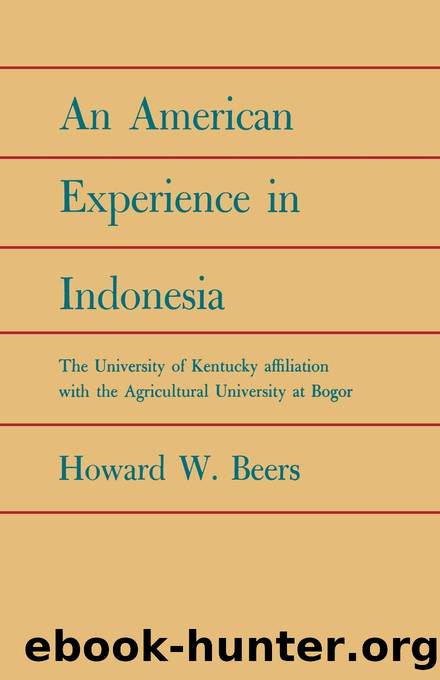An American Experience in Indonesia by Unknown

Author:Unknown
Language: eng
Format: epub
Publisher: University Press of Kentucky
Published: 2021-08-15T00:00:00+00:00
Opinions, in Retrospect
Except for political opposition during peaks of anti-Western emphasis, there was widespread IPB approval of the participant program. Skepticism was occasionally expressed, however, and the following discussion presents Kenteam and IPB opinion with sample comments on the criticisms made.
A majority (62%) of the participants who had returned to Bogor before Kenteamâs departure had been promoted one or two ranks above their previous level. Several others had returned recently and might expect promotion as soon as the internal developmental processes at IPB had organized the necessary departmental and college arrangements.
There was a tendency among both Kenteam and IPB members to evaluate participant training against somewhat unrealistic expectations that returnees would make immediate, full, and fruitful application of their new knowledge upon return to duty in Bogor. While overseas, absent members had been missed by family and faculty; upon return they were met affectionately by family but somewhat querulously by faculty. It was not everywhere understood that the benefit of foreign study, like that of any advanced study, is revealed over a period of time, not all at once. It was not everywhere understood that the greatest benefit is in the continuance of intellectual growth which eventually, but perhaps not immediately, finds practical application in problem-solving and crops out in teaching, in research, and in service to community. But the time of evaluation began immediately by colleagues who had waited at home and by all who had an interest in the outcome of the training program.
One IPB staff member complained that study abroad made the participants less, not more, able to meet expectations of the Indonesian people in regard to national progress and development. On this question, Kenteam and IPB membersâ judgments differed slightly, but among the Kenteam and IPB opinions combined, there were two confirmations of âmore ableâ for each one of âless ableâ; in other words, a two-to-one endorsement of the participant program. A representative Kenteam view was, âI think the one most important thing they see in the U.S. is that the individual can have an effect in bringing about change (contrary to insja Allah [God-willing], mungkin [maybe], barankali [perhaps]). And they learn some of the means to do this.â
A majority of Kenteam (67%) and an even larger majority of IPB (who were really in a better position to know) agreed that participants had taken initiative and demonstrated self-confidence by introducing new courses, changing course content, and using new teaching methods on their return from overseas study. Half or more, by their own report, had undertaken to use various new teaching methods: making use of libraries, requiring reading, allowing interruption of lectures with questions, organizing field trips, assigning term papers, using laboratory teaching, giving frequent quizzes, adopting informality in lecturing. Not so many (but between 30% and 50%) of the returnees were assigning homework, assigning grades along the range of percentiles, using objective tests, and determining grades from âthe curve.â
Incidental other features of American college and university organization and activity had been learned by the participants, especially
Download
This site does not store any files on its server. We only index and link to content provided by other sites. Please contact the content providers to delete copyright contents if any and email us, we'll remove relevant links or contents immediately.
| Africa | Americas |
| Arctic & Antarctica | Asia |
| Australia & Oceania | Europe |
| Middle East | Russia |
| United States | World |
| Ancient Civilizations | Military |
| Historical Study & Educational Resources |
The Memory Code by Lynne Kelly(2401)
Schindler's Ark by Thomas Keneally(1884)
Kings Cross by Louis Nowra(1797)
Burke and Wills: The triumph and tragedy of Australia's most famous explorers by Peter Fitzsimons(1427)
The Falklands War by Martin Middlebrook(1384)
1914 by Paul Ham(1345)
Code Breakers by Craig Collie(1252)
A Farewell to Ice: A Report from the Arctic by Peter Wadhams(1248)
Paradise in Chains by Diana Preston(1247)
Burke and Wills by Peter FitzSimons(1238)
Watkin Tench's 1788 by Flannery Tim; Tench Watkin;(1232)
The Secret Cold War by John Blaxland(1213)
The Protest Years by John Blaxland(1205)
THE LUMINARIES by Eleanor Catton(1196)
30 Days in Sydney by Peter Carey(1160)
Lucky 666 by Bob Drury & Tom Clavin(1155)
The Lucky Country by Donald Horne(1140)
The Land Before Avocado by Richard Glover(1119)
Not Just Black and White by Lesley Williams(1085)
